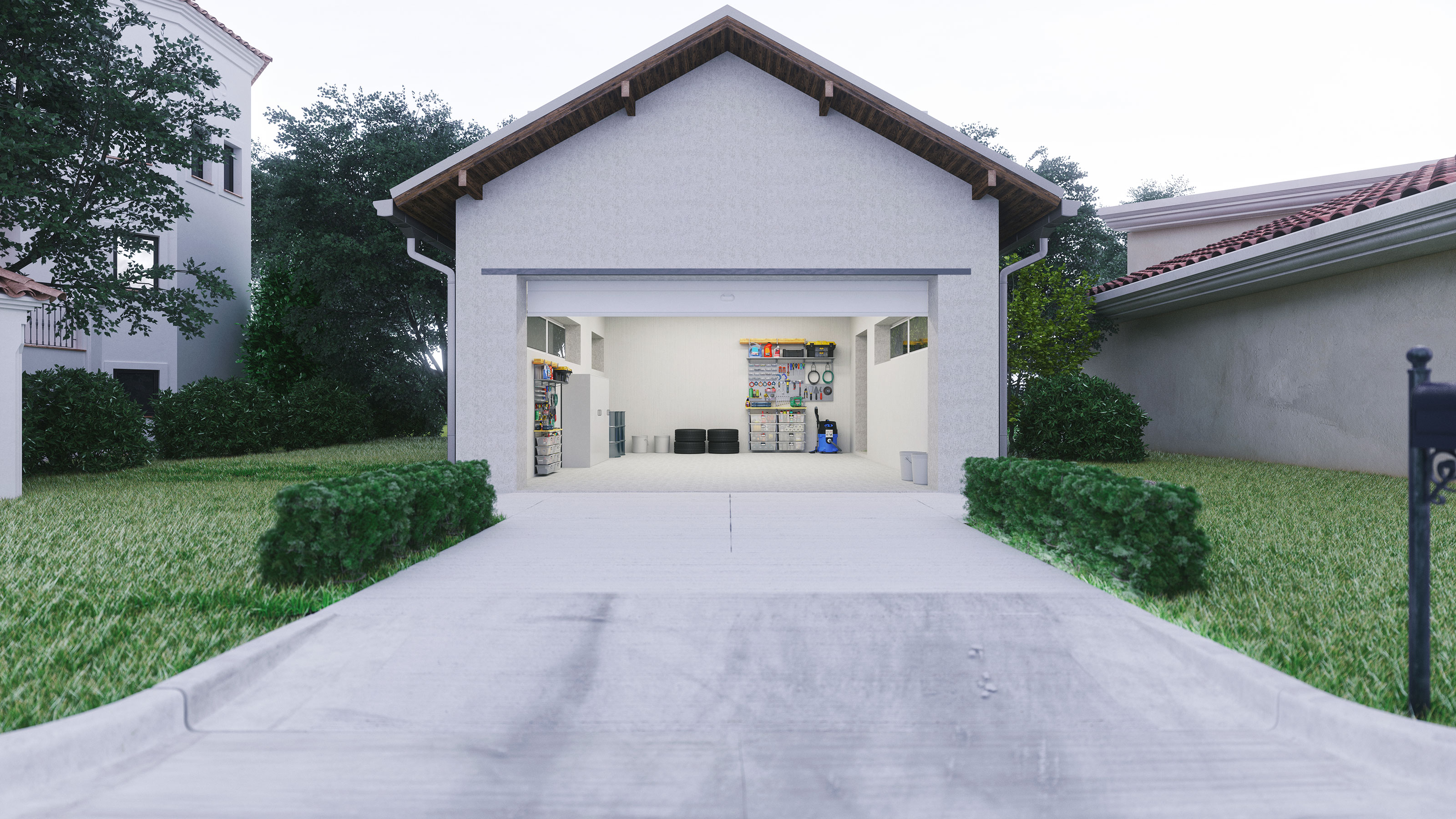How much does a new driveway cost in 2022?
A freshly paved or concrete driveway will boost curb appeal. This is how much a new driveway will cost you in 2022 and how long each will typically last you.


Get small space home decor ideas, celeb inspiration, DIY tips and more, straight to your inbox!
You are now subscribed
Your newsletter sign-up was successful
A new driveway has the potential to make your home’s exterior look a whole lot more appealing, but if you’re planning one, you’ll need to know how much a new driveway costs.
Your overall driveway design has a major impact on the appearance of the front yard, so it’s important to select the right material, be that concrete, gravel, pavers or another option. But the different types of driveways also come in at different prices, so you’ll need to select a material that’s within your budget.
From concrete driveway costs to how much pavers, asphalt and more popular options will be, we’ve put together a guide to help you draw up your plans – whatever your household needs and budget.
With know-how about the driveway material choices on offer, and their durability, plus why a new driveway has the potential to add value to your home.
Driveway costs 2022
A number of factors determine the cost of a new driveway. ‘In addition to the material used, the cost of a new driveway also varies depending on the size, type, and location,’ says Rinal Patel, licensed realtor and co-founder of We Buy Philly Home. ‘Other expenses to consider include the condition of the land or if it’s being installed as a replacement for your current driveway.’
As for what you can expect to pay? ‘Paving a new driveway costs an average of $4,482, but typically falls in the range of $2,403 to $6,563,’ says Bailey Carson, home care expert at Angi.
Driveway costs by material
The material selected for the driveway is an important element in what you’ll pay, and materials fall in a range between $1 and $50 per square foot, according to Bailey, who offers the following guide to the cost of popular materials:
Get small space home decor ideas, celeb inspiration, DIY tips and more, straight to your inbox!
- Gravel: $1 to $2 per square foot
- Chip seal/tar-and-chip: $5 to $10 per square foot
- Asphalt: $7 to $13 per square foot
- Concrete: $8 to $18 per square foot
- Rubber: $10 to $25 per square foot
- Pavers: $10 to $50 per square foot
- Grass (pavers plus small areas of grass in between): $10 to $15 per square foot
When drawing up your budget and making a choice among materials, don’t forget the long term. Driveway materials differ in their durability, so it’s worth factoring in their likely lifetimes.
‘Gravel driveways tend to last the longest, with a lifespan of 100 years when adequately cared for,’ says Bailey. ‘They’re also the least expensive option per square foot, making them a great choice for your home. Other long-lasting materials include concrete and pavers, such as natural stone and marble. If longevity is important to you, stay away from chip seal driveways, as they only last about 10 years.’
Bear in mind when selecting materials that your climate matters. ‘For example, concrete is an excellent choice for warm climates but tends to crack in extremely cold temperatures,’ advises Bailey. ‘Do some research and talk to local pros to find what works best for your climate before committing to a material.’
What other driveway costs are there?
Unless you have the skills and equipment to do the work yourself, you will need to call in professionals to build a new driveway. ‘You should expect between $5 and $7 per square foot for labor costs,’ says Bailey. ‘Depending on where you live, labor can end up being up to 50 percent of the total project cost.’
You’ll likely also need to budget for the prep work. ‘Before you can pave your new driveway, you’ll have to get the land ready, which usually costs between $5 and $8 per square foot,’ says Bailey. ‘This step includes evening out the land to help prevent serious problems from happening down the road.’
Which other factors impact driveway costs?
The design of the driveway is important. ‘The size, thickness and shape of your driveway will also affect the cost of your project,’ says Bailey. ‘Short, thin and straight driveways generally cost less than long, winding and thick driveways.’
If you’re redesigning and landscaping a front yard on a budget, opt for a shorter and thinner drive. ‘They require less material and less labor time,’ says Bailey.
The vehicles that use the driveway could drive up costs. ‘Concrete driveways should be at least 4 inches thick,’ says Kerry Sherin, a consumer advocate at Ownerly. ‘But if you drive heavy-duty vehicles, then you might need to buy more materials to increase the thickness.’
A steeply slanted driveway could also increase costs, according to Kerry, as could design tweaks. ‘Once you pave the driveway, you can customize it with options such as staining, engraving or stamping, which also increases the price tag,’ she says.
Does a new driveway add value to your home?
A new driveway can add value to your home, so long as it improves your home’s exterior design, and provided that it is a quality installation also. ‘A new driveway that looks and feels nice can attract potential buyers and raise the overall value of your home,’ says Bailey. ‘At the same time, a poorly installed or damaged driveway can have the opposite effect.’
Kerry Sherin agrees. ‘Outdoor projects have always been a popular way to add curb appeal or tackle much-needed maintenance plans,’ she says. ‘Revamping the driveway is one way to do both – and it could even add value to your home, depending on the market, typical homes in your area and the type of material you choose.’
What is the cheapest option for a driveway?
If you’re looking for the cheapest option for a driveway, gravel is the answer. ‘The least expensive material is gravel, specifically recycled asphalt product or RAP; it is very durable and needs little maintenance,’ says Stephen Keighery, CEO and founder of Home Buyer Louisiana.

Sarah is a freelance journalist and editor writing for websites, national newspapers, and magazines. She’s spent most of her journalistic career specialising in homes – long enough to see fridges become smart, decorating fashions embrace both minimalism and maximalism, and interiors that blur the indoor/outdoor link become a must-have. She loves testing the latest home appliances, revealing the trends in furnishings and fittings for every room, and investigating the benefits, costs and practicalities of home improvement. It's no big surprise that she likes to put what she writes about into practice, and is a serial house revamper. For Realhomes.com, Sarah reviews coffee machines and vacuum cleaners, taking them through their paces at home to give us an honest, real life review and comparison of every model.